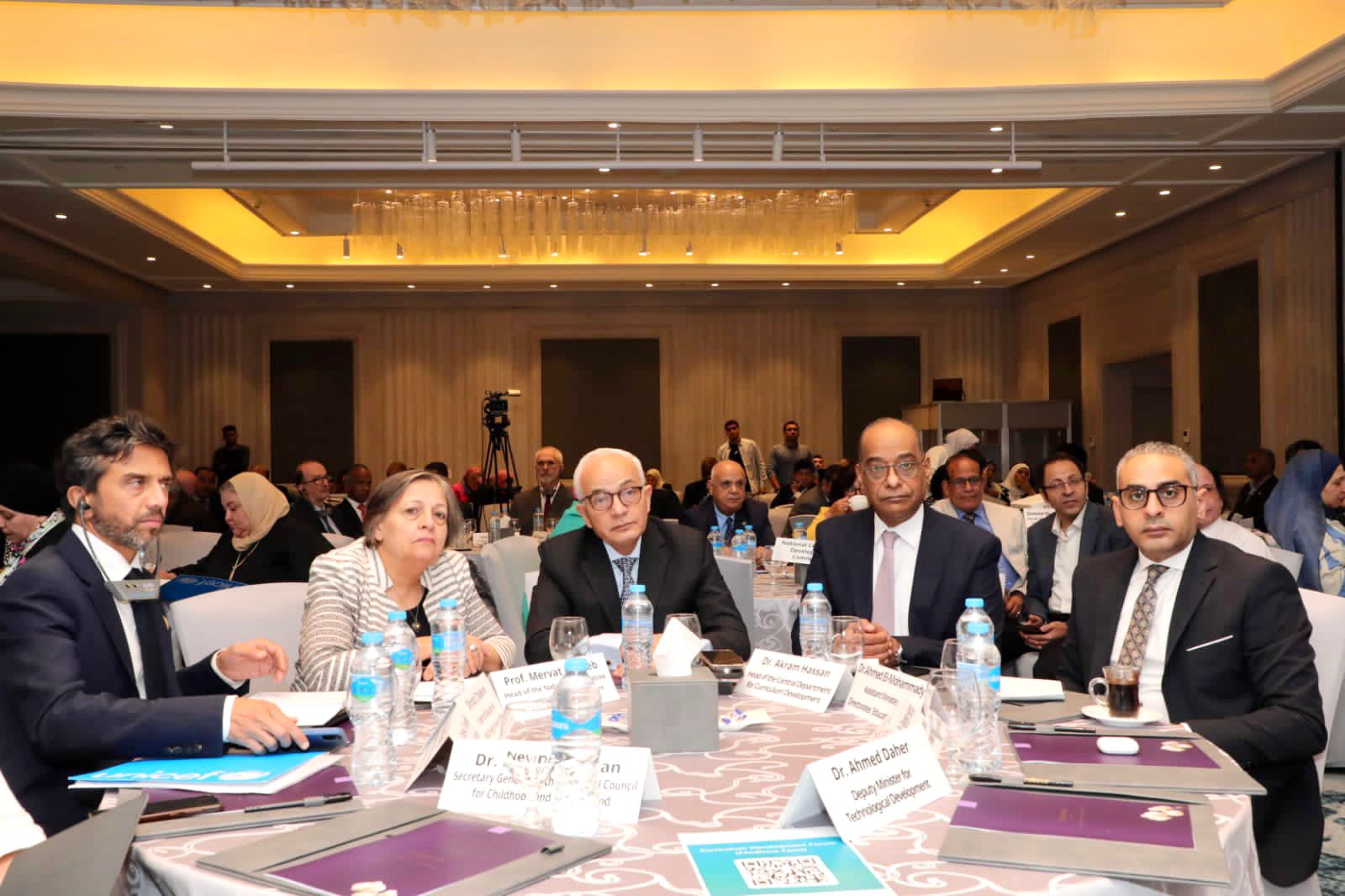The Minister of Education witnesses the special session on "good practices in developing the general framework of curricula and their impact on learning outcomes"

Dr. Reda Hegazy, Minister of Education and Technical Education, witnessed today the special session on "good practices in developing the general framework of curricula and their impact on learning outcomes", during the activities of the second day of the "Curriculum Development (Visions and Experiences)" forum, which is organized by the Ministry in cooperation with UNICEF Egypt over the course of a year. On the 6th and 7th of August.
Amira Kazem, Senior Officer for Education Department Operations at the World Bank, reviewed the good practices in developing the general framework of the curricula and their impact on learning outcomes, stressing that the aim of developing the curricula is to improve learning outcomes and the readiness of school graduates for life and work.
She stressed that the aim of this session is to present the international practices of curricular frameworks, the basic features and directions of education in the frameworks of developing education and improving literacy, and the link between developing curricula and improving literacy.
She added that the curriculum is a powerful, effective and influencing tool on students' performance and their future, directing teachers' performance, as well as good communication and interaction between the student, teacher, parent and community.
She explained that when curricula are characterized by effectiveness, flexibility and adaptation to life conditions, they support teachers and their performance, students and society as a whole.
She indicated that the elements of the curriculum framework, and the basics of a good curriculum adapted to the requirements of life, are knowledge, values, skills, and attitudes, with an emphasis on literacy, arithmetic, psychological health, mental health, and life skills.
She pointed out that the link to improving learning outcomes is improving literacy, noting that today's children will use technology in an unimaginable way, and will work in jobs that have not been invented yet, so they need self-learning skills and lifelong learning.
Amira Kazem touched on the need to pay attention to how to train and evaluate children, how to use formative assessment, classroom management, learning process management, emphasis on self-learning, focus on higher skills, and problem-solving in a creative, flexible, cooperative and sympathetic manner, emphasizing the interdependence between higher thinking skills and life skills. .
She also pointed out the importance of the curriculum as an important and effective element for developing students’ academic performance, which is one of the main features of high-performing countries, as these countries are committed to a flexible, renewable curriculum that adapts to life and the requirements of the local, regional and global community, so that when the student finishes his studies at the secondary level, he possesses with knowledge, skills and values, explaining that the curriculum is all that reaches the student or teacher in terms of learning materials, activities and a safe educational environment, as the book is part of the curriculum and not the entire curriculum.
She also indicated that policies must be based on a system of education, learning and professional development for teachers and the inclusion of technology and learning outcomes to bring about real change in society and the economy, noting that education is one of the most important features that break poverty and achieve economic development.
She added that education is an important, effective and effective tool in reducing poverty rates, achieving equal opportunities and social justice, stressing the importance of relying on the quality of education and education rates among children and youth to achieve a good future for them.
Amira Kazem added that improving literacy is linked to learning outcomes, emphasizing the motto "We learn how to read in order to read in order to learn."
This came in the presence of Shiraz Shakra, Head of the Education Department at UNICEF Egypt, Dr. Mervat El-Deeb, Professor of Curricula and Instruction at Benha University, Member of the Presidential Advisory Council of Egyptian Scholars and Experts and Chairman of the Preparatory Stage Curricula Preparation Committee, as well as the presence of a number of representatives of the House of Representatives and Senate, including Representative Rasha Kleib, a member of the House of Representatives representing the Coordination of Youth Parties and Politicians, MP Mahmoud Turki, a member of the Senate representing the Coordination of Youth Parties and Politicians, as well as the participation of a large number of international experts and representatives of a number of publishing houses.
On the part of the Ministry, Dr. Jihan Kamal, Assistant Minister for Educational Research, Dr. Ramadan Muhammad, Assistant Minister for Examinations and Educational Evaluation, Dr. Ahmed Al-Muhammadi, Assistant Minister for Directorate Affairs, Dr. Akram Hassan, Head of the Central Administration for Curriculum Development, and Dr. Sherine Hamdy, Advisor to the Minister for Administrative Development and Supervisor of the Central Administration, attended. for the Affairs of the Minister’s Office, Dr. Zainab Khalifa, Director of the Professional Academy for Teachers, and a number of education leaders.
